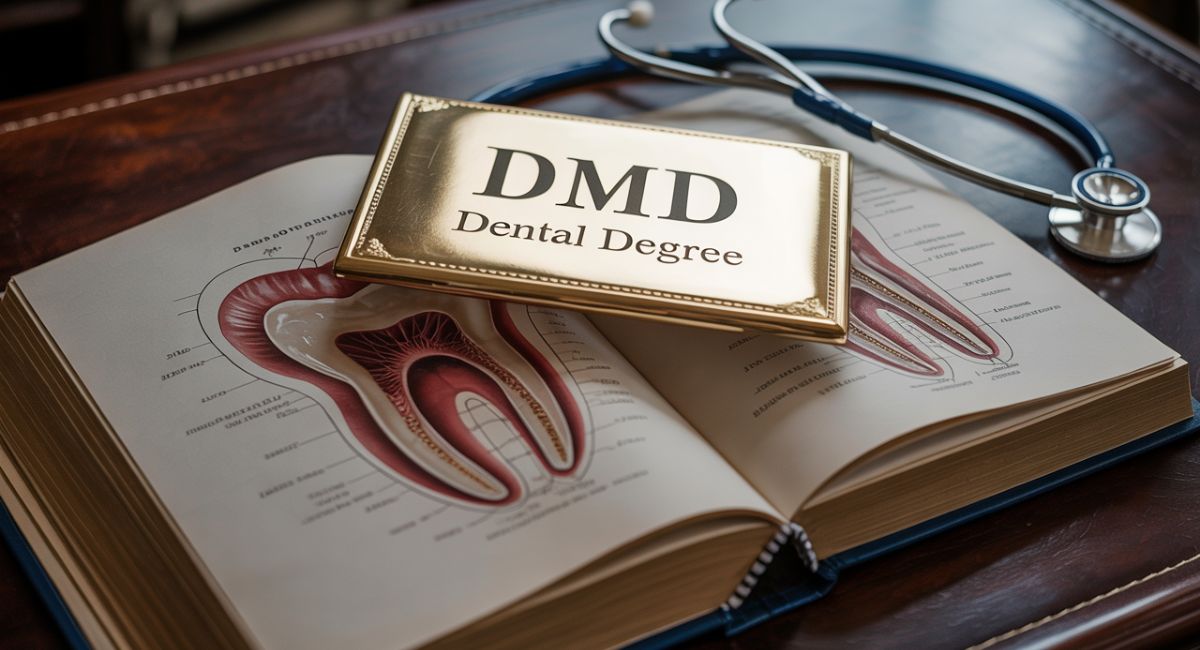🦷 What Is DMD in Dentistry? Meaning, Definition, and Why It Matters
When you visit the dentist, you might notice the title “DMD” after their name. But what does that really mean? Understanding the DMD definition in dental care can give you a clearer picture of your provider’s education and qualifications. Whether you’re a curious patient or a prospective dental student, this guide breaks down everything you need to know.
🔎 DMD Dental Degree: Full Form, Meaning, and Role in Oral Health
DMD stands for Doctor of Medicine in Dentistry or Doctor of Dental Medicine. It’s a professional degree awarded to dental school graduates in the United States and some other countries.
Despite the difference in letters, DMD and DDS (Doctor of Dental Surgery) are equivalent degrees. The difference comes down to the dental school’s preference in terminology, not curriculum or scope of practice.
💡 Quick Facts:
- DMD = Doctor of Dental Medicine
- DDS = Doctor of Dental Surgery
- Both require the same education and licensing exams
- Equal in qualifications and practice rights
🎓 History and Origin of the DMD Dental Degree
The DMD degree was first introduced by Harvard University in 1867. At the time, Harvard only conferred degrees in Latin, and “Chirurgiae Dentium Doctor” (CDD)—Latin for Doctor of Dental Surgery—didn’t fit their standards.
So, they coined a new term: “Dentariae Medicinae Doctor” (DMD). Other institutions eventually adopted the DDS title, while some, including Harvard and the University of Pennsylvania, kept DMD.
Today, about one-third of U.S. dental schools award the DMD degree, while the rest award DDS.
🏫 DMD vs DDS: Understanding Dental Degrees in Oral Health
| Feature | DMD | DDS |
| Full Form | Doctor of Dental Medicine | Doctor of Dental Surgery |
| Curriculum | Identical to DDS | Identical to DMD |
| Licensing Exams | National Board Dental Examinations (NBDE) or INBDE | Same exams |
| Recognition | Fully recognized by ADA & licensing boards | Same |
| Practice Scope | Full range of dental services | Full range of dental services |
✅ Conclusion: There is no clinical or academic difference between DMD and DDS.
🧠 Educational Path to a DMD Dental Degree
Becoming a DMD is no small feat. It typically takes 8 years of education:
📘 Step-by-Step Path:
- Bachelor’s Degree (4 years)
- Focus on science courses: biology, chemistry, physics
- Focus on science courses: biology, chemistry, physics
- Dental Admission Test (DAT)
- A standardized test required by all U.S. dental schools
- A standardized test required by all U.S. dental schools
- Dental School (4 years)
- Leads to a DMD or DDS degree
- Leads to a DMD or DDS degree
- Licensing Exams
- National and state board exams
- National and state board exams
- Optional Residency (for specializations)
👉 For more detailed health education resources, visit MedlinePlus Encyclopedia.
🧑⚕️ What a DMD Dental Degree Qualifies a Dentist to Do
DMDs are trained to perform a wide range of dental procedures and treatments, including:
- Diagnosing oral diseases
- Performing restorative procedures like fillings and crowns
- Conducting oral surgery (extractions, root canals)
- Providing preventive care and education
- Administering anesthesia
- Designing prosthetics (dentures, bridges)
- Treating gum diseases
- Screening for oral cancer
Additionally, some DMDs pursue further education to specialize in fields like:
- Orthodontics
- Oral Surgery
- Endodontics
- Periodontics
- Pediatric Dentistry
🌐 Why the DMD Dental Degree Matters in Oral Health Care
For patients, knowing what DMD means in dental care helps you trust your provider’s credentials. For students, it’s essential to understand the pathway to this respected title.
Regardless of whether your dentist holds a DMD or DDS, what matters most is their experience, communication, and patient care approach.
📝 Tip: Always check if your provider is licensed and accredited by relevant boards. Visit 56news.org to learn more about choosing the right dental provider.
🔚 Conclusion
In summary, the DMD definition in dental simply reflects a dental school’s choice of degree title—Doctor of Medicine in Dentistry. It is academically and clinically identical to DDS and is fully recognized by all licensing authorities.
So the next time you see “DMD” after your dentist’s name, you’ll know exactly what it stands for—and that you’re in skilled, qualified hands.
📌 Want more health and dental care insights? Browse articles at 56news.org.
❓ FAQ: DMD Definition Dental
1. What does DMD mean in dental terms?
DMD stands for Doctor of Medicine in Dentistry. It’s a professional degree for licensed dentists.
2. Is a DMD better than a DDS?
No, both are equivalent in education and practice. The only difference is in the degree name.
3. How long does it take to become a DMD?
Typically 8 years—4 years of undergraduate study and 4 years in dental school.
4. Can a DMD perform surgeries?
Yes, general dentists (DMD or DDS) are trained to perform various dental surgeries.
5. Are all dentists either DDS or DMD?
In the U.S., yes. Dentists hold either a DDS or DMD, both of which are fully accredited.








